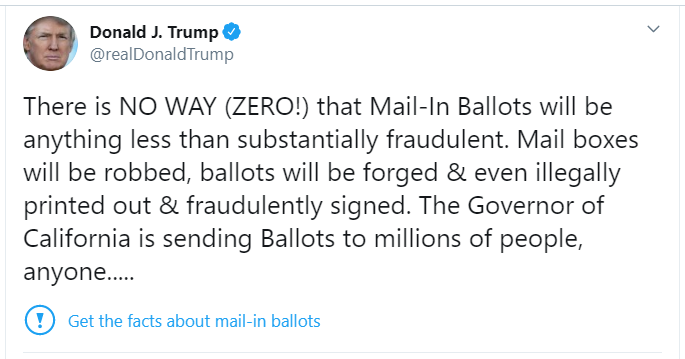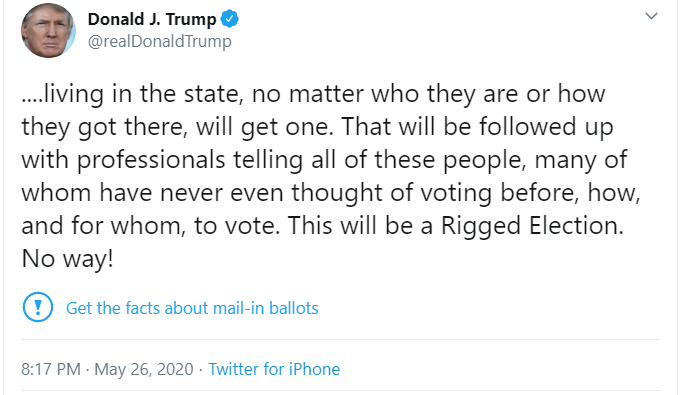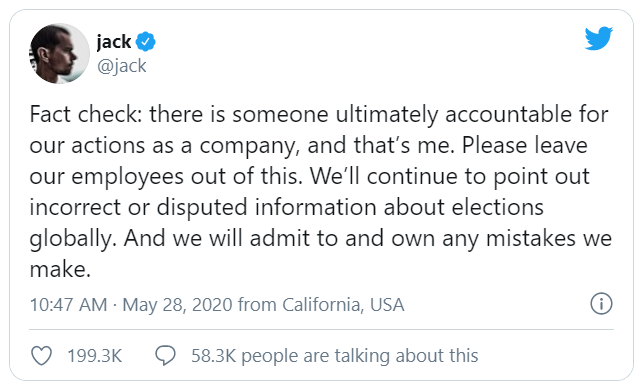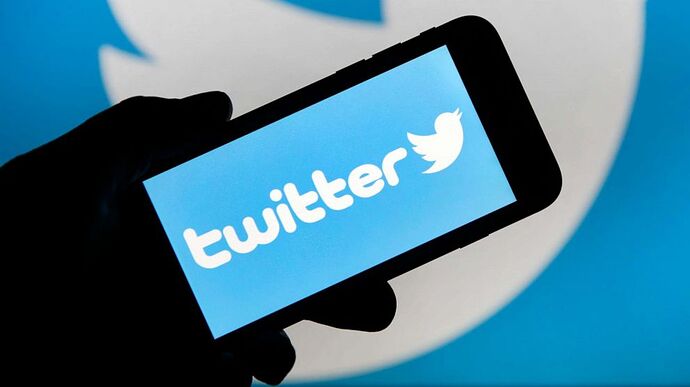(Image source: Cnet)
President Donald Trump signed an executive order Thursday that takes aim at social networks such as Twitter and Facebook. The order came after Twitter labeled Trump’s tweets about mail-in ballots for containing “potentially misleading information.”
During the signing, Trump said that social media companies aren’t “neutral platforms,” adding that Twitter becomes an “editor with a viewpoint” when it bans accounts, edits or takes down posts.
“The censorship and bias is a threat to freedom itself,” Trump said. “Imagine if your phone company silenced or edited your conversation. Social media companies have vastly more power and more reach than any phone company in the United States.”
Social media companies have repeatedly denied they censor conservative speech, but Twitter’s fact-checking of Trump’s tweets have reignited a debate about whether they’re neutral platforms or publishers. Both Twitter and Facebook have said they don’t want to be an “arbiter of truth.”
A Google spokeswoman said the company’s content policies have no political bias.
“We have clear content policies and we enforce them without regard to political viewpoint,” the spokeswoman said. “Our platforms have empowered a wide range of people and organizations from across the political spectrum, giving them a voice and new ways to reach their audiences. Undermining Section 230 in this way would hurt America’s economy and its global leadership on internet freedom.”
(Image source: ABC News)
Twitter declined to comment. Facebook said it was a platform for diverse views and that its rules apply to everyone.
“Repealing or limiting section 230 will have the opposite effect. It will restrict more speech online, not less. By exposing companies to potential liability for everything that billions of people around the world say, this would penalize companies that choose to allow controversial speech and encourage platforms to censor anything that might offend anyone,” a Facebook spokesperson said in a statement.
Signing the executive order doesn’t change how Twitter and Facebook operate, at least not for now. Instead, it calls for the government to clarify a federal law that shields online companies from liability for content posted by users.
Experts, who read the draft order on Wednesday, say that it will likely be challenged in court, and some raised concerns about its impact on free speech.
“Much as he might wish otherwise, Donald Trump is not the president of Twitter. This order, if issued, would be a blatant and unconstitutional threat to punish social media companies that displease the president,” ACLU senior legislative counsel Kate Ruane said in a statement before the executive order was signed.
(Image source: Cnet)
Trump said he anticipates the order will be challenged in court, but expected to “do very well.”
The order instructs the Commerce Department to ask the Federal Communications Commission to call a rule-making proceeding to rethink Section 230 of the Communications Decency Act from 1996, which protects online platforms from liability for content posted by users. It also gave the Federal Trade Commission responsibility for investigating complaints of political bias and determining if tech companies’ content moderation policies conflict with their pledges for neutrality.
The order directs government agencies to review the amount of federal dollars it spends on online platforms as well. It asks US Attorney General William Barr to work with state attorneys general to study allegations of bias.
Barr, who joined Trump during the signing of the executive order, said that Section 230 has been stretched beyond its original intention and that social media companies have engaged in a bit of a “bait and switch.”
Online platforms grew because they held themselves out as free public forums where a variety of voices can be heard. Now “they are using that market power to force particular viewpoints,” he said.
The FCC and FTC are independent agencies so it’s up to them to decide whether to carry out Trump’s order. “This debate is an important one. The Federal Communications Commission will carefully review any petition for rulemaking filed by the Department of Commerce,” Ajit Pai, chairman of the FCC, said in a statement after Trump signed the order.
Trump’s move came after Twitter added labels to two of his tweets in which he claimed that mail-in election ballots would be “fraudulent.” Clicking on Twitter’s label brings you to a page with tweets from news outlets that state mail-in ballots are rarely linked to voter fraud and that Trump’s claims are “unsubstantiated.” Trump also falsely stated in his tweets that California will send mail-in ballots to “anyone living in the state, no matter who they are or how they got there.” Only registered voters will receive ballots.


(Image source: Twitter)
During the press briefing, Trump still denied that his tweet was incorrect. He said that he was referring to people taking other voter’s ballots in what he called “ballot harvesting.”
On Wednesday night, Twitter boss Jack Dorsey responded to criticism of his company’s executives over the labels.

(Image source: Twitter)
“Fact check: there is someone ultimately accountable for our actions as a company, and that’s me. Please leave our employees out of this,” he wrote. “We’ll continue to point out incorrect or disputed information about elections globally. And we will admit to and own any mistakes we make.”
Dorsey also added that labeling Trump’s tweets doesn’t make Twitter an “arbiter of truth.” Trump’s tweets, he said, might “mislead people into thinking they don’t need to register to get a ballot.”
Despite Dorsey’s remarks, Trump continued to point fingers at Yoel Roth, who heads Twitter’s site integrity. Roth had posted tweets critical of Trump several years ago, but Twitter said that a single person wasn’t in charge of the decision to fact-check the president’s tweets.
Twitter’s approach contrasts with Facebook, which didn’t label Trump’s remarks about mail-in ballots. Facebook typically doesn’t send posts and ads from politicians to its third-party fact-checkers. In interviews that aired on Fox News and CNBC, Facebook CEO Mark Zuckerberg said that political speech is already heavily scrutinized and he thinks internet platforms shouldn’t be “arbiters of truth.”
(Image source: Cnet)
While the executive order calls out Facebook, Twitter and Google for censoring political speech, some experts say Trump has actually benefited from current interpretations of Section 230.
“Section 230 incentivizes platforms to host all sorts of content without fear of being held liable for it. It enables speech, not censorship,” Ruane said. “If platforms were not immune under the law, then they would not risk the legal liability that could come with hosting Donald Trump’s lies, defamation, and threats.”
Michael Kleinman, director of Amnesty International’s Silicon Valley Initiative, called Trump’s executive order “disturbing.” “Threats and retaliation against platforms that are performing the simple act of fact-checking are all the more disturbing by an administration that continues to attack the media and journalists for performing the vital task of speaking truth to power. The President is not the decider of truth. Continuing to exploit prejudice is dangerous and irresponsible,” he said in a statement.
Trump signaled that more action outside of an executive order would come. Republican lawmakers are also drafting legislation to strip online companies from legal protections for posts by users. Trump has also said in the past that he would consider shutting down Twitter and social media companies. Trump said Thursday he wasn’t sure how that would happen, but that he would have to ask lawyers and go through a legal process.
“If it were able to be legally shut down I would do it. I think I’d be hurting (Twitter) very badly if we didn’t use it anymore,” he said.
Source: Cnet
